- Home
- M. Louisa Locke
Victorian San Francisco Stories Page 10
Victorian San Francisco Stories Read online
Page 10
Annie blushed and smiled back.
“Yes, I was once married.” Wong’s smile vanished. “A young woman of the Hakki, my father’s clan. My mother’s people, the Punti, were not pleased. She died in childbirth, as did the child.”
“Oh, Mr. Wong, I am so sorry.” The sharp pain of her own losses always resurfaced with any glimpse at another’s grief.
“Well…more than thirty years have passed. I left soon after to take up another life here, met Master Voss, and his family became mine.”
Annie wondered if that meant he had adopted his master’s religion as well, if so, he might not be adverse to the religious goals of the Chinese Mission. She knew Matthew Voss had been a long-time member of the First Presbyterian Church in the city. Yet, when she worked in the Voss household as the servant Lizzie, it was Wong who was expected to stay working on Sundays while the other servants got time off to attend to their respective spiritual needs.
Her own religious upbringing had been ecumenical at best. As a young girl, her life on the ranch outside of Los Angeles meant that Sunday religious observance consisted of reading out loud to her invalid mother, whose Universalist beliefs meant she was as likely to be reading Thoreau’s essay on Waldon Pond as the Bible. Annie went once to a mass with one of the wives of a Mexican ranch hand, and she had fond memories of when their Chinese cook, Choy, let her light the incense sticks he put in front of a miniature statue he had in his room off the kitchen. She’d thought he said the man with long flowing mustaches was confused, but later she realized Choy said it was a stature of Confucius.
Once Annie moved to New York after her mother’s death, Sundays were spent with her father, reading through the weekly and daily newspapers as he instructed her to look for clues to determine what the stock markets would do on Monday. During her ill-fated marriage and the years after her husband’s death when she was forced to live with whichever branch of his family needed her unpaid labor the most, her in-laws expected her to join them at Henry Ward Beecher’s fashionable Brooklyn Presbyterian church. In 1874, when the notorious Victoria Woodhull accused Beecher of committing adultery with a member the congregation, Annie hadn’t been surprised when her in-laws firmly sided with Beecher since she was used to them professing a devotion to Christian principles they never put into practice. Coming full circle, she now found some comfort, when she had the time, attending the San Francisco Unitarian Universalist Society just four blocks away on the 100 block of Geary. She appreciated the fact that the members of this congregation didn’t seem particularly interested in converting anyone, certainly not the Chinese here or abroad.
A sound interrupted these thoughts, and Annie saw that Miss Greenstock and her mother stood just inside the door, along with the older Chinese man that Annie recognized as Chan Hon Fan, the Mission staff member. He was holding onto the little girl’s hand. She wasn’t crying this afternoon, but her drooping head, with wisps of black hair escaping from her embroidered cap, her eyes, dull and red-rimmed, and her hunched shoulders, all painted a picture of despair. Annie, now looking for it, saw that the embroidery on her top represented a dragon entwined with some mythical feathered bird.
Beside her, Wong, who had stood up, said under his breath, “As I suspected, long feng boa.”
Before she could ask what he meant, Wong put his clasped hands up to his forehead and bowed. He said a few words to Chan Han Fan, in what Annie assume was a Cantonese dialect, since this man kept nodding. Wong then turned to the Greenstocks and said, “Please, may I approach and speak with the little Miss?”
Mrs. Greenstock, after consulting the man beside her, said, “Mr. Wong, I have been assured that you are a member of the Hakka clan and a respected member of the Yan Wo Society, so I will permit this. However, do try not to upset her further. She is beyond exhaustion, and we fear for her well being if we can not get her to eat or sleep.
Wong moved slowly forward and then stopped a few feet away from the little girl and began to speak quietly in a language that neither Annie, and from the puzzled looks on their faces, nor the Greenstocks recognized. But the effect of his words on the little girl was little short of miraculous. Her head went up, her eyes brightened, and she uttered a little cry and went running into Wong’s waiting arms, where she buried her head into his shoulder. For several minutes he stood, holding her tightly as he asked questions and listened intently to her whispered answers.
He then looked at the Greenstocks and said, “She is Mei. She is eight, and her parents are recently deceased. She was traveling with her grandfather, who died mid-way in the crossing. I know of this because he wrote several months ago to the Yan Wo Company asking about opportunities in San Francisco. I was told of the letter because I was related by marriage to the Li clan. I gathered that Mei’s grandfather had gotten into some difficulties, sided with the wrong faction in the ongoing struggles between the Punti and the Hakka, and was looking to emigrate. I hadn’t heard about any grandchildren. Unfortunately, there are no members of the Li clan, as far as I know.”
“Oh dear,” Mrs. Greenstock said. “That is unfortunate. Under such circumstances, the U.S. Customs usually sends the individual back to China. I can’t imagine she would survive the passage. And so young, how would we determine if there was family back there to take care of her? But with your help, maybe we can get her to settle down with us, at least until we know what is best to do for her.”
As she spoke, Mrs. Greenstock moved towards Wong, her arms outstretched to take Mei back from him. Mei cried out and wrapped her arms and legs tightly around Wong, clinging desperately to him and sobbing. Mrs. Greenstock stepped hurriedly back.
Wong whispered to the little girl and patted her back, but she just continued to cry. Finally he said something sharp, and she reared her head back in what Annie thought was shock. Wong said a few more words, and Mei stopped crying and nodded reluctantly. He leaned over and placed her gently on the ground and pointed to the Greenstocks. Mei moved slowly towards them, looking back to Wong, who nodded encouragingly. Finally she let Evelyn Greenstock lift her up into her arms. Mei put her head down wearily on the young woman’s shoulder.
“Please Madam,” Wong then said, looking at Mrs. Greenstock “If Mr. Chan will take a note from me to my housekeeper, who is also Hakka, she will come immediately to stay with Mei until needed.”
“Mr. Wong, that would be most appreciated. I do understand that you must return to your….”
“No, you misunderstand me. There is simply no time to be wasted. As I suspected from Mrs. Fuller’s description of the dragon and phoenix embroidered on Mei’s jacket, she wasn’t traveling alone with her grandfather. When your Reverend Jensen took her off of the ship, he separated her for the first time in her life from her twin brother, Song. And I fear since the captain did not stop this and no one from the Hakka community has come for Mei that this may mean that Song has fallen into the hands of one of the enemies of the Hakka. I must find him immediately and reunite these two, or I fear for both of their lives.”
*****
“At least we were able to bathe her last night and she fell asleep afterwards for a few hours,” Mrs. Greenstock said to Annie as they stood and observed Mei sitting on the lap of Mr. Wong’s housekeeper, Mrs. Chu. “But she still won’t eat.”
Annie was at the Methodist Episcopal Chinese Mission early again this morning for the financial meeting with Mrs. Greenstock that was cancelled the day before. She’d been ushered into the combination parlor and dining room where the remnants of breakfast were being cleared away by two young Chinese girls, and she could see through the open doors to several dormitory-style rooms where other girls were making beds, sweeping, and tidying the rooms. Mrs. Greenstock, who was an older and even more soberly dressed version of her daughter, explained that teaching the rescued women basic domestic tasks was part of the curriculum. “Our hope is that this will help them run their own homes when they marry,” she commented. “They all want to mother Mei, but the girl won’t let anyone bu
t Mrs. Chu touch her.”
“Oh dear,” Annie said. “Have you heard anything from Mr. Wong?”
“He sent a message last night saying that the captain of the SS Acapulco finally confessed to him that he had let one of the labor contractors have Mei’s brother and that he was pursuing that information.”
“That is dreadful,” said Annie. “But I have faith that if anyone can find Song, it will be Mr. Wong. I would trust him…I have trusted him with my life.”
“Several of the men who attended chapel this morning talked to Reverend Jensen about Mei, and they told him that Mr. Wong is well-known as a mediator between the Punti and the Hakka—being one of the few Chinese in the city who can claim heritage from both. It helps that he migrated to California right before the Taiping Revolution broke out, so he wasn’t involved in any of the bloodshed between the two groups. I was surprised, however, when one man said that Mr. Wong is a fairly wealthy property owner—even owning some property outside of China Town. I thought you said he was a cook and manservant?”
Annie shrugged, and said, “You could have knocked me down with a feather when Mr. Wong said he was sending for his housekeeper. I knew like most Chinese manservants that he didn’t live-in, but I imagined him rooming in some depressing basement room. But a good cook, and one like Wong who also acted as manservant, can make twice what an ordinary parlor maid can make, upwards to $50 a month. I suppose I shouldn’t be surprised that after thirty years of steady employment he could have saved enough money for his own home and servant.”
That servant, Mrs. Chu, a short, stocky woman with a round face and merry eyes, cradled Mei, tenderly rocking her back and forth and singing what must be some sort of lullaby in the Hakka language. Mei visibly relaxed in her arms.
“Mrs. Chu speaks English quite well, and she told us that she is a cousin of his late wife’s and that he paid for her to come to America twenty years ago.” Miss Greenstock added, “Evidently she has worked for him ever since. She speaks quite highly of him.”
Annie thought about the Voss family, Wong’s employers, and how given their recent financial difficulties that he could actually be better off than they were. She wouldn’t be surprised to learn that he continued to work for them more out of kindness than necessity.
A flurry of noise behind them prompted Annie and Mrs. Greenstock to turn around, and they saw that the young girls who’d been tidying up were scurrying to join the other women who were clustered around the dormitory room doors, staring at the three people who had just arrived from the back stairs. Evelyn Greenstock and Mr. Wong bracketed a young boy, dressed in faded, patched garments two sizes too big for him, and Annie could see he’d been treated badly by someone. Despite a red welt marring his forehead and a purple bruise staining his left cheek, the family resemblance was unmistakable.
Puzzled by the boy’s hesitation and the way he was wildly looking around the room, Annie said, “Oh my word. He can’t see her,” and stepped hurriedly aside.
With a strangled cry, the boy sped across the room as Mei launched herself at him, and the two twins entwined, the dragon and the phoenix again reunited.
*****
“I start to cry every time I think about it, Nate.” Annie dabbed at her eyes, wishing her nose didn’t turn such an unbecoming shade of pink when she was moved to tears. The memory of how the young twins stood with their arms around each other and their faces pressed cheek to cheek stuck indelibly in her mind. Their features were so identical that only the traditional shaved hairline on Song distinguished him from his sister. But the differences in their personalities became clear when Mei noticed the state of Song’s face, and, exclaiming loudly, she began to examine every inch of him, looking for additional injuries. Song stood stoically under her ministrations until he finally frowned and said something Annie guessed was Hakka for “stow it.”
Nate pulled her closer to him on the settee, and Annie sighed with pleasure. Now that they were formally engaged, Nate expressed his affection more openly, even when they were sitting in the main parlor and knew that the Misses Moffet, the two elderly boarders, might pop in at any moment.
Kissing the top of her head, Nate said, “Did Wong say where he found the boy? You said it looked like he had been beaten.”
“He told us it took him most of the night, and he finally found Song in a warehouse near the docks, with twenty or so other men.” Annie felt the tears return, saying, “Oh Nate, when I think what would have happened if Mr. Wong hadn’t found him, I can’t bear it. Mr. Wong said they were going to be taken across the Bay at first light and shipped south to join one of the gangs working on the completion of the Southern Pacific rail line to Yuma. If he hadn’t gotten there when he did, Song might never have been heard of again.”
Nate said, “You read about this sort of thing happening, but I thought it was mostly the press exaggerating to stir up anti-Chinese sentiment.”
“Considering who employed the labor contractors, I don’t know that the Chinese as a race can be blamed for what happened. Wong said something about the necessity of judging people when they were acting out of greed but to be more forgiving of those who were acting out of the desperation caused by poverty. I feel confident that, of all the people who were responsible for the kidnapping of Song, Charles Crocker and the other ‘Big Four’ railroad magnates were the greediest and should be judged the most harshly.”
“Yes, yes I am sure you are right,” Nate said, giving her another hug. “But what is going to happen now? Song can’t stay in the Female Refuge, and it doesn’t sound like these two should be separated.”
“Oh, no. Mei wouldn’t stand for that. But, Nate, you won’t believe what solution Mr. Wong has come up with. First of all, did you know that he was a naturalized citizen, and he owns property outside of China Town?”
Nate looked down at her in puzzlement and said, “What does that have to…wait a minute. Yes, I remember when I was wrapping up the Voss estate that I saw a copy of his naturalization papers. My uncle said that Voss had insisted Wong apply as soon as California became a state, so he was one of the few who got their papers before the court’s settled that only Chinese born in the States could be citizens. So yes, he would be able to own property wherever he wanted to. But I don’t….”
“Because he is a citizen, Nate, he can adopt both Song and Mei, and that is what he is going to do. And Wong said that he was already planning on retiring from his position with the Vosses, that he knew just the young man to replace him, so he would have time to devote to the children.”
“Good heavens, that is a shock. But what a perfect solution. The fact that Wong and his housekeeper speak their language will make it all the easier for them, and if he really is so financially well-off, their future will be assured.”
“I know it’s really quite wonderful. At first, Mrs. Greenstock was a bit taken aback. I wondered if she was reluctant to lose a potential convert in Mei. But no, I am being unkind. Once Wong assured them that he would enroll both children in the Chinese school that the Presbyterian Mission holds down on Sacramento, and that he welcomed them to visit Mei and Song at his home whenever they wished, they got on board with the plan. They even offered the help of the Mission lawyer if there were any legal difficulties with the adoption.”
Nate smiled at her and said, “After all this, did you get the job working for the Female Refuge? They would be fools not to employ you. They should hire you out of gratitude alone. Imagine what would have happened if you hadn’t taken the initiative to contact Wong and ask for his help.”
For a moment, Annie’s mind filled with the terrible fear that accompanied a glimpse into an alternative future of what might have been—Song, bloody and broken by the hard labor working on a railroad gang and Mei, wasting away in grief at being separated from her precious twin. And then she took a deep breath and blessed Wong for preventing that future from ever happening.
The End
Historical Tidbits
I began writing my
Victorian San Francisco mystery series because I hoped to use entertaining fiction to illustrate what life was like for women who lived and worked in the late 19th century. Most of the basic historical detail comes from the research I did for my history doctoral dissertation entitled “‘Like a Machine or an Animal’: Working Women of the Far West in the Late Nineteenth Century.” For that monograph, I read books, articles, newspapers, diaries, memoirs, and novels, and I did a thorough data analysis of the 1880 manuscript census for San Francisco, Portland, and Los Angeles. For each novel and short story, I have done further historical research, and the following essays describe what some of that research revealed for each short story. You can find additional historical information on the series as a whole on my website at www.mlouisalocke.com.
Madam Sibyl’s First Client
One of the reasons that I created Annie Fuller’s alter ego, Madam Sibyl, was that women in the nineteenth century who wanted to support themselves often found it easier to claim supernatural powers than professional expertise in what were considered “male” occupations. For example, the very first women to make a living lecturing to the public did so as trance mediums who said they were “channeling” the spirits of the (usually male) departed. Women who engaged in medical practice (at a time when female health practitioners were being marginalized) often claimed to make their diagnosis through the help of spirits, communicating through such phenomena as slate writing. Women, like Annie Fuller as Madam Sibyl, who made a living giving personal and financial advice, usually did so under the guise of clairvoyance in some form. See for example, Ann Braude’s Radical Spirits (1989), or the two biographies of Victoria Woodhull, Barbara Goldsmith’s Other Powers (1998) and Mary Gabriel’s Notorious Victoria (1998).

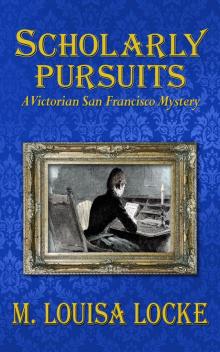 Scholarly Pursuits
Scholarly Pursuits Lethal Remedies
Lethal Remedies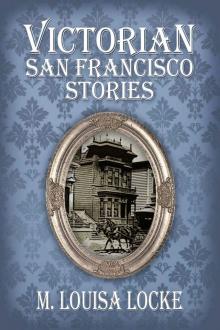 Victorian San Francisco Stories
Victorian San Francisco Stories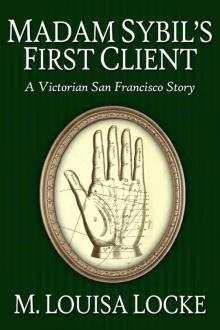 Madam Sibyl's First Client: A Victorian San Francisco Story
Madam Sibyl's First Client: A Victorian San Francisco Story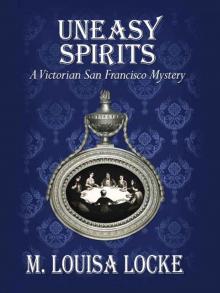 Uneasy Spirits: A Victorian San Francisco Mystery
Uneasy Spirits: A Victorian San Francisco Mystery Dandy Detects: A Victorian San Francisco Story
Dandy Detects: A Victorian San Francisco Story Pilfered Promises
Pilfered Promises Dandy Delivers
Dandy Delivers Kathleen Catches a Killer
Kathleen Catches a Killer Violet Vanquishes a Villain
Violet Vanquishes a Villain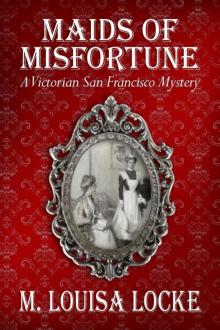 Maids of Misfortune: A Victorian San Francisco Mystery
Maids of Misfortune: A Victorian San Francisco Mystery